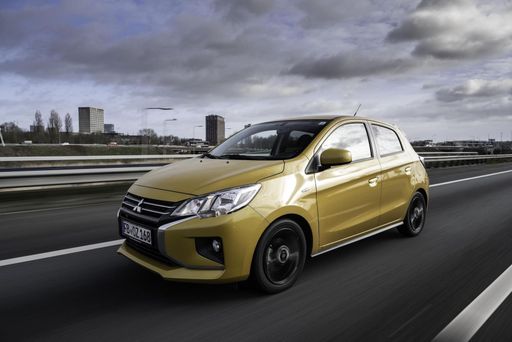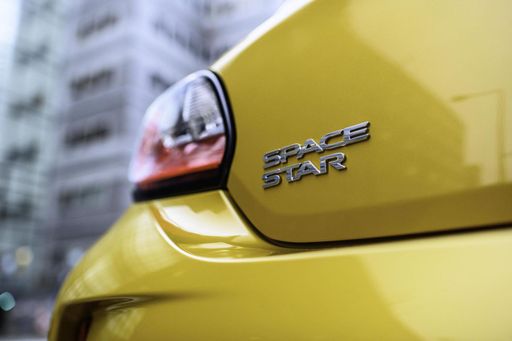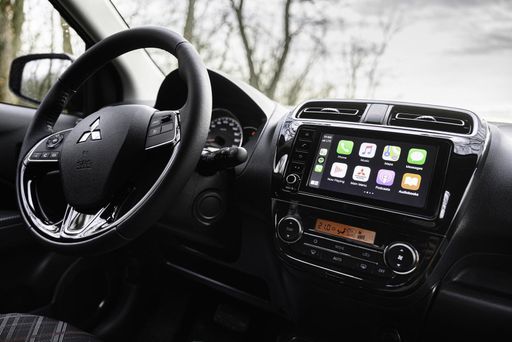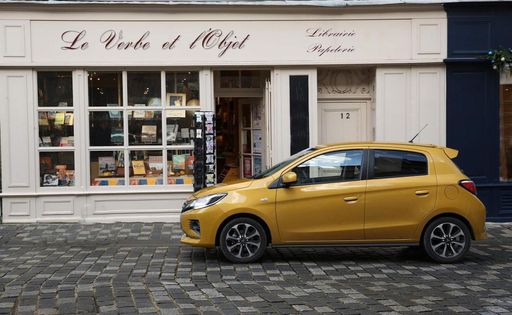Nissan Interstar vs Mitsubishi Space Star – Differences & prices compared
Compare performance, boot space, consumption and price in one view.
Find out now: which car is the better choice for you – Nissan Interstar or Mitsubishi Space Star?
The Nissan Interstar (Cargo Van) comes with a Diesel or Electric engine and Manuel or Automatic transmission. In comparison, the Mitsubishi Space Star (Hatchback) features a Petrol engine with Manuel or Automatic transmission.
When it comes to boot capacity, the Nissan Interstar offers , while the Mitsubishi Space Star provides 235 L – depending on how much space you need. If you’re looking for more power, decide whether the 170 HP of the Nissan Interstar or the 71 HP of the Mitsubishi Space Star suits your needs better.
In terms of consumption, the values are 7.40 L per 100 km for the Nissan Interstar, and 4.90 L for the Mitsubishi Space Star.
Price-wise, the Nissan Interstar starts at 34900 £, while the Mitsubishi Space Star is available from 11600 £. Compare all the details and find out which model fits your lifestyle best!
Nissan Interstar
The Nissan Interstar is a versatile van that expertly combines practicality with modern design. It offers a spacious interior that caters to both cargo and passenger needs, making it ideal for businesses and families alike. With its robust performance and efficient fuel consumption, the Interstar stands out as a reliable choice in the commercial vehicle market.
detailsMitsubishi Space Star
The Mitsubishi Space Star offers a compact yet surprisingly spacious experience, making it an ideal choice for urban dwellers who need agility and comfort. Its sleek design is complemented by a range of vibrant colour options, adding a touch of flair to everyday commutes. With a focus on efficiency and practicality, the Space Star combines a user-friendly interface with modern technology to ensure a smooth driving experience.
details @ presse.mitsubishi-motors.de
@ presse.mitsubishi-motors.de
 @ presse.mitsubishi-motors.de
@ presse.mitsubishi-motors.de
 @ presse.mitsubishi-motors.de
@ presse.mitsubishi-motors.de
 @ presse.mitsubishi-motors.de
@ presse.mitsubishi-motors.de

|
|
|
|
|
Costs and Consumption |
|
|---|---|
|
Price
34900 - 55600 £
|
Price
11600 - 18700 £
|
|
Consumption L/100km
7.4 - 7.5 L
|
Consumption L/100km
4.9 - 5.5 L
|
|
Consumption kWh/100km
-
|
Consumption kWh/100km
-
|
|
Electric Range
175 - 410 km
|
Electric Range
-
|
|
Battery Capacity
-
|
Battery Capacity
-
|
|
co2
0 - 195 g/km
|
co2
112 - 125 g/km
|
|
Fuel tank capacity
80 L
|
Fuel tank capacity
35 L
|
Dimensions and Body |
|
|---|---|
|
Body Type
Cargo Van
|
Body Type
Hatchback
|
|
Seats
3 - 7
|
Seats
5
|
|
Doors
4
|
Doors
5
|
|
Curb weight
2053 - 2535 kg
|
Curb weight
940 - 1009 kg
|
|
Trunk capacity
-
|
Trunk capacity
209 - 235 L
|
|
Length
5680 - 6315 mm
|
Length
3845 mm
|
|
Width
2080 mm
|
Width
1665 mm
|
|
Height
2498 - 2756 mm
|
Height
1505 mm
|
|
Payload
965 - 1447 kg
|
Payload
360 - 400 kg
|
Engine and Performance |
|
|---|---|
|
Engine Type
Diesel, Electric
|
Engine Type
Petrol
|
|
Transmission
Manuel, Automatic
|
Transmission
Manuel, Automatic
|
|
Transmission Detail
Manual Gearbox, Automatic Gearbox, Reduction Gearbox
|
Transmission Detail
Manual Gearbox
|
|
Drive Type
Front-Wheel Drive
|
Drive Type
Front-Wheel Drive
|
|
Power HP
105 - 170 HP
|
Power HP
71 HP
|
|
Acceleration 0-100km/h
-
|
Acceleration 0-100km/h
14.1 - 15.8 s
|
|
Max Speed
115 - 177 km/h
|
Max Speed
163 - 167 km/h
|
|
Torque
300 - 380 Nm
|
Torque
102 Nm
|
|
Number of Cylinders
4
|
Number of Cylinders
3
|
|
Power kW
77 - 125 kW
|
Power kW
52 kW
|
|
Engine capacity
1997 cm3
|
Engine capacity
1193 cm3
|
General |
|
|---|---|
|
Model Year
2024 - 2025
|
Model Year
2020 - 2023
|
|
CO2 Efficiency Class
G, A
|
CO2 Efficiency Class
C, D
|
|
Brand
Nissan
|
Brand
Mitsubishi
|
Nissan Interstar
The Evolution of the Nissan Interstar
The Nissan Interstar has long been a staple in the commercial vehicle sector, known for its robust build and practical design. The latest iterations have further cemented its status with a range of technical enhancements and innovative features aimed at aiding businesses in achieving optimal efficiency. Whether you're navigating city streets or traversing the highways, the Interstar stands out as a reliable workhorse ready to meet various transport needs.
Power and Performance
The current range of Nissan Interstar models boasts diesel engines ranging from 105 to 180 PS, offering a commendable blend of power and fuel efficiency across the board. With a fuel consumption of between 7.4 and 7.5 litres per 100 kilometres, these vehicles are designed to minimise operational costs while maximizing performance.
All models feature four-cylinder engines, with engine displacement between 1997 and 2299 cm³, capable of producing torque figures between 330 and 400 Nm. These specifications ensure that the Interstar offers superior pulling power, which is particularly useful for transporting heavy loads across different terrains.
Transmission and Drive Options
Versatility is at the heart of the Nissan Interstar, with transmission options including both manual and automatic gearboxes. Drivers can also choose between front-wheel and rear-wheel drive configurations, allowing the vehicle to suit specific logistical requirements or personal preferences.
For those seeking simplicity and ease of use in urban environments, the Interstar with its automated gearshift provides a smooth driving experience, reducing driver fatigue and increasing focus on the road ahead.
Dimensions and Load Capacities
The Nissan Interstar is available in various lengths, from 5048 mm to an extensive 6848 mm, catering to diverse commercial needs. With widths ranging from 2070 mm to 2222 mm and heights from 2307 mm to 2808 mm, the Interstar offers multiple configurations to maximise cargo space and accommodate various loads.
With a maximum payload capacity of up to 1451 kg, businesses can rest assured that the Interstar is more than capable of delivering goods efficiently without compromising on safety or comfort.
Innovation and Technological Features
While functionality remains a priority, Nissan has not skimped on technological advancements. Among the innovations included are advanced safety features, such as anti-lock braking systems (ABS), electronic stability control (ESC), and a variety of sensors to assist with parking and reversing.
In terms of driver comfort, the brand offers multiple trim levels with exceptional interior features designed to enhance driver experience during long hauls. Options such as climate control, advanced navigation systems, and modern infotainment setups are available, ensuring that both driver and passenger remain comfortable and connected, regardless of the journey length.
Coachwork and Trim Options
The Interstar line-up provides a range of trim levels and equipment lines, from the entry-level Visia to the high-spec Tekna, catering to different market demands and individual preferences. The selection allows buyers to prioritise features that best suit their operation or driving style.
For example, the N-CONNECTA variant offers an array of added extras, enhancing both connectivity and comfort for drivers who rely on the vehicle as a mobile office.
Conclusion
The Nissan Interstar represents a harmonious blend of power, efficiency, and technological innovation in the large van segment. With its vast array of options and features, the Interstar is undeniably a top choice for businesses looking to invest in a dependable and adaptable commercial vehicle. As the line-up continues to evolve, the Interstar remains poised to meet the growing challenges and demands of the modern logistic landscape.
Mitsubishi Space Star
Introducing the Mitsubishi Space Star: A Perfect Blend of Efficiency and Innovation
The Mitsubishi Space Star continues to impress urban drivers with its compact yet efficient design. Celebrated for its practicality and fuel economy, this hatchback offers a unique blend of new-age technology and reliable performance. Let’s dive into some of the technical details and innovations that make the Space Star a popular choice among compact car enthusiasts.
Engine and Performance
The Space Star is powered by a 1.2-litre, 3-cylinder petrol engine, delivering a respectable 71 PS (52 kW). The engine provides a harmonious balance of power and efficiency, reaching a top speed of up to 167 km/h. With a torque of 102 Nm, drivers can expect smooth city rides and decent highway cruising capabilities. The Space Star's economy ranges from 4.9 to 5.5 litres per 100 kilometres, ensuring that your journeys remain budget-friendly and environmentally considerate.
Transmission and Driving Dynamics
When it comes to the driving experience, buyers have the option of a 5-speed manual transmission or a CVT automatic. This flexibility allows for a more personalised driving experience, whether you prefer the engagement of manual shifting or the convenience of an automatic gearbox. The car's front-wheel-drive setup further enhances its maneuverability, making it an ideal companion for navigating tight city streets.
Design and Dimensions
The Mitsubishi Space Star is designed to turn heads with its sleek, aerodynamic lines while maintaining a practical size. Measuring 3845 mm in length, 1665 mm in width, and 1505 mm in height, it's a perfect fit for urban driving. Despite its compact form, the Space Star offers five seats and five doors, providing ample accessibility and comfort for both the driver and passengers.
Interior Features and Comfort
Inside, the Space Star prioritises comfort and convenience with thoughtfully designed interiors. The luggage space ranges from 209 to 235 litres, ideal for shopping trips or weekend getaways. The vehicle comes in a variety of trim levels, including Basis, Plus, Select, and Top, with each offering distinct features to meet different customer needs. Whether you need basic amenities or more premium touches, the Space Star has a version that will suit your lifestyle.
Safety and Environmental Impact
Safety innovation is a hallmark of the Mitsubishi Space Star, ensuring peace of mind for drivers and passengers alike. Its CO2 efficiency class ranges from C to D, with emissions between 112 to 125 g/km, reflecting its dedication to reducing the environmental footprint. These features contribute to making the Space Star a responsible choice for the eco-conscious driver.
Cost of Ownership
Affordability is another attractive aspect of the Space Star. Prices range from €13,590 to €21,790, making it accessible for a wide array of budgets. Running costs are equally competitive, with monthly expenses estimated between €627 and €767, and cost per kilometre ranging from 25.1 to 30.7 cents, all contributing to a car that is as economical to own as it is to drive.
Conclusion
In summary, the Mitsubishi Space Star offers a compelling package of efficiency, practicality, and modern technology. Its combination of fuel economy, flexible transmission options, and affordability make it a standout choice in the compact car segment. For those looking for a reliable and economical city car, the Space Star remains a strong contender that shouldn't be overlooked.
Which drive types are available for the Nissan Interstar?
Available as .
The prices and data displayed are estimates based on German list prices and may vary by country. This information is not legally binding.
